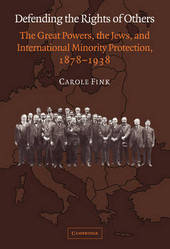
|
Defending the Rights of Others: The Great Powers, the Jews, and International Minority Protection, 1878-1938
Hardback
Main Details
Description
When the Cold War ended between 1989 and 1991, statesmen and scholars reached back to the period after World War I when the victors devised minority treaties for the new and expanded states of Eastern Europe. This book is the first study of the entire period between 1878 and 1938, when the great powers established a system of external supervision to reduce the threats in Europe's most volatile regions of irredentism, persecution, and uncontrolled waves of westward migration. It is a study of the strengths and weaknesses of an early state of international human rights diplomacy as practised by rival and often-uninformed Western political leaders, by ardent but divided Jewish advocates, and also by aggressive state minority champions, in the tumultuous age of nationalism and imperialism, bolshevism and fascism between Bismarck and Hitler.
Author Biography
Carole Fink is the Professor of European History at the Ohio State University. She has written several books, including The Genoa Conference: European Diplomacy, 1921-22 (1984), which was awarded the George Louis Beer Prize of the American Historical Association, and Marc Bloch: A Life in History (Cambridge, 1989), which has been translated into five languages.
Reviews"Carole Fink's Defending the Rights of Others is a masterpiece of exhaustive research, engaging narrative, and lucid analysis that revives and reinterprets the long neglected but critically important subject of the campaign by the European powers to afford protection to religious and ethnic minorities within the new states in Eastern Europe that were carved out of the Ottoman, Habsburg, Romanov, and Hohenzollern Empires...this work sets a new standard of scholarship in the field of international history." William R. Keylor, Professor of History and International Relations and Director of the International History Institute, Boston University "Based on an extraordinary sweep of archives and published materials, this is an original and badly needed survey of a topic rarely explored or even touched on in the history of the 19th and 20th centuries but that is becoming a central issue in the international politics of our time: the role of the world community in the protection of minorities in sovereign states." Gerhard L. Weinberg, Emeritus Professor of History, University of North Carolina, Chapel Hill "Professor Fink's latest work makes a major contribution to our historical understanding of the growing need to defend human rights on a transnational scale. This volume is the product not only of her pioneering archival research, but also of the unsurpassed maturity of judgment in this field that she has developed over many years of scholarly concern with its riches and complexities." Michael Biddiss, Professor of Modern European History, University of Reading "...contributes substantially to our understanding of the practice of official and non-official diplomacy at the Paris Peace Conference and the drafting and implementation of the minority treaties, but also reminds us that internationally sanctioned minority protection emerged in the context of expansionist nationalism. This book will be of particular interest for scholars of diplomatic and modern Jewish history, but is an important read for anyone concerned with theorizing the link between ethnic violence and state formation." - H-German, Aimee Genell, Department of History, the Graduate Center, City University of New York "This richly detailed and important book displays impressive scholarship. It deserves a wide readership and should be mandatory reading in advanced courses on Europe, human rights, and diplomacy in the twentieth century." Holocaust and Genocide Studies "...the research for this volume is truly impressive...Refreshingly, Fink's impressive study reminds us that good diplomatic history is still a pleasure to read, as well as it has much to teach." - Jewish History, Frederic Krome "Fink has identified a significant gap in the historiography, and she deserves applause for wading through a sea of material in several languages in order to fill it." Journal of Modern History David Cesarani, University of London "Finke's is a truly extraordinary contribution." - Eugene C. Black, Brandeis University
|